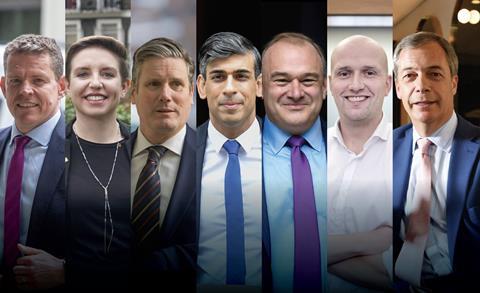What do Christians want from the next government? Tim Wyatt takes a look at the policies, issues and concerns that are highest on your agenda

Several Christian groups have surveyed believers about their priorities this election season. The Evangelical Alliance (EA) polled more than 1,300 evangelicals and concluded that the top five issues were: the economy, poverty, equality/justice, integrity/trust and Christian values.
This is not too dissimilar to the wider British public. When asked by pollsters in late 2023, the most important issues facing Britain were: inflation, the economy, immigration, the NHS and housing.
The arguments about economics – controlling inflation, getting the right balance between taxation and spending, what kind of social security net we need – divide Christians just as much as the rest of society. But other issues that churchgoers are particularly focused on may not get as much media attention.
The flashpoints
The issue most likely to make Christians vote for a specific party was protection of free speech for “deeply held beliefs”. A whopping 87 per cent of evangelicals said it would make them more likely to vote for a party that upheld this, according to the EA research.
James Mildred, director of communications and engagement at Christian lobby group CARE, said that the ban on conversion practices, in particular, “and the impact that will have on church freedom and a church’s ability to teach on controversial issues” was the most commonly discussed issue.
The Conservatives first promised to ban conversion therapy – efforts to change or suppress someone’s sexuality or gender identity – in 2018, four prime ministers ago. The policy has gone through many amendments and U-turns, and the Conservative manifesto now says they will take more time to consider the issue if re-elected.
While most British Christians oppose coercive attempts to forcibly change someone’s sexuality, many have concerns that a ban could unintentionally make it a crime for a church to offer pastoral prayer or counselling to a congregant who actively sought to resist sexual sin. It could also make preaching parts of the Bible that condemn homosexual activity problematic.
Labour’s manifesto promises to deliver a “full trans-inclusive ban” on conversion therapy, calling it “abuse”. Similarly, the Liberal Democrats support a legal ban, with one of their peers introducing such a bill into the House of Lords earlier this year.
When it comes to what will win over evangelical voters, there is no obvious single policy
The second most favoured policy in the EA survey was reforming the Equality Act to ensure single-sex spaces remain protected – 83 per cent of evangelicals said this pledge would make them more likely to vote for a party.
Concerns about single-sex spaces emerged from the tumult of the recent transgender debate. The 2010 Equality Act (passed by the last Labour government) makes it illegal to discriminate on the basis of a “protected characteristic” – such as age, disability, religion, sexual orientation or sex. But the law is unclear on whether this refers to biological sex or those who have legally changed sex. This has led to confusion over whether a women’s refuge, for example, could legally refuse entry to a biologically male trans woman.
The Conservative Party manifesto states that they will: “introduce primary legislation to clarify that the protected characteristic of sex in the Equality Act means biological sex”. They have insisted they are not attempting to stoke division or attack trans people, but rather prevent predatory men trying to gain access to women’s-only spaces.
The Liberal Democrats have highlighted the party’s commitment to human rights but make no mention of single-sex spaces in their manifesto. Instead, they intend to make the gender recognition process simpler and say they would “recognise non-binary identities in law and remove the spousal veto”.
The third most popular policy in the EA survey was opposition to assisted suicide. The major Westminster parties continue to approach this as a conscience question, giving their MPs free votes on the issue. While Lib Dem party policy has been to back assisted dying, their manifesto is not proscriptive, rather suggesting more time is needed to fully debate the proposal.
Keir Starmer has said he is “personally in favour of changing the law” and has pledged a free vote on the issue if elected. Rishi Sunak has also said he is “not against” assisted dying.
Social care, immigration and abortion
Daniel Singleton, executive director of charity FaithAction, which has also surveyed Christians ahead of the election, said that Christians were not solely focused on contentious ethical flashpoints. “Some people are talking about more compassionate, safe, practical routes to immigration. Some are talking about funding. Social care comes up a bit. So far, it’s not really touched on culture war stuff at all.”
What motivates many believers to vote is a desire to help others, so social care will undoubtedly be a priority for many believers who go to the polls on 4 July. The Liberal Democrats have made social care reform a focus of their campaign, with Sir Ed Davey talking about prioritising support for carers and the disabled.
The Conservative party have been less strident, but say they will build on additional investment in the sector and give local authorities a multi-year funding settlement to support their work. Labour promised “deep reform” of social care in their manifesto. “Our new standards will ensure high-quality care and ongoing sustainability, and ensure providers behave responsibly.”
For many other Christians, climate change will be at the forefront of their minds as they prepare to vote, and the pro-environment policies of the Green Party, coupled with their pledge to spend £50bn per year on health and social care by 2030, may be appealing.
The topic of immigration is also high on the agenda this year, with plenty of believers concerned by the rising numbers of both legal migration (which hit historically high levels of more than 650,000 in both 2022 and 2023) and illegal migration across the Channel. But, unlike the broad consensus that seems to have formed in the Church on opposing assisted suicide or backing free speech, immigration divides believers. “It’s very, very polarising,” says Mildred. “Some Christians think the Rwanda policy is immoral and are very concerned by the Tory approach; others think something does need to be done, even if not Rwanda.”
Mildred said that he has found, anecdotally, that church leaders in coastal towns were more aware of migration as a big issue among their congregants, compared with churches in larger, inland cities.
On this topic, there are clear dividing lines between the parties, something smaller parties – such as Reform UK, led by Nigel Farage – have successfully exploited to achieve campaign cut-through.
Rishi Sunak made stopping small boats and bearing down on legal migration a cornerstone of his government, although he has so far failed on both counts. His flagship policy of forcibly resettling asylum seekers in Rwanda to deter others will be the centrepiece of the Conservative approach if they are re-elected.
Labour has said it wants to reduce immigration (although it has not offered a firm target figure) but would drop the Rwanda policy and instead invest in law enforcement efforts to break up criminal smuggling gangs, particularly on the French side of the border.
The Lib Dems’ policy is to scrap the “unworkable Rwanda scheme” and create more safe, legal asylum routes, which they argue would reduce the demand for dangerous small boat Channel crossings.
Our role is to work out how to apply what we believe
Finally, abortion is close to many believers’ hearts. After a long period in which UK politics refused to debate the question, abortion has returned to the headlines in recent years, with fiery discussions about buffer zones around clinics, lowering the time limit for abortions or full decriminalisation.
There was a concerted push before the election by a number of Labour backbenchers to introduce legislation decriminalising abortion. Some Christian MPs attempted to piggyback on the same (now lost) Criminal Justice Bill to do the reverse and lower the abortion time limit to 22 weeks, arguing that advances in medicine meant many children born before the current 24-week limit could now survive.
Two-thirds of the evangelicals polled by the EA said a manifesto promise to reduce the time limit on abortion would appeal to them. While the Tories and Labour make no mention of abortion in their manifestos, the Lib Dems have pledged to “protect everyone’s right to make independent decisions over their reproductive health without interference by the state”.
When it comes to what will win over a large block of evangelical voters this July, there is no obvious single policy, says Danny Webster from the EA. “All policies have a moral dimension, and as Christians, part of our role is to work out how to apply what we believe to the complexities of modern-day life.” This will be the main task ahead of Christians as we edge ever closer to polling day.






































1 Reader's comment